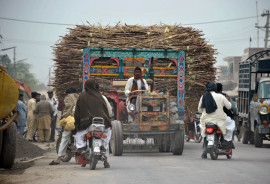
The prices of basic items such as tomatoes, onions, potatoes and squash have in some cases quadrupled in recent days, putting them out of reach for many people who struggled to get by even before the floods hit.
“It is like a fire erupted in the market,” said Mohammad Siddiq as he purchased vegetables in Lahore. “Floods and rains have made these things unaffordable.”
The government has worked with international partners to rescue more than 100,000 people and provide food and shelter to thousands more. But it has struggled to cope with the scale of a disaster that it estimates has affected 13 million people, and could get worse as heavy rains lashed the country again on Sunday.
Many flood victims have complained they have not received aid quickly enough or at all, and this anger could increase as rising food prices across the country affect many more people in this nation of 180 million.
“The floods have destroyed agricultural fields and washed away vegetable crops ready for harvest,” said Zahid Gardezi, a farmer in Multan. “Whatever farmers stored they cannot transport because roads have washed away and communication links are down.”
At least 1.4 million acres of crops have been destroyed in Punjab, said the UN. Many more crops were devastated in the northwest, where destruction from the floods has been most severe and many residents were still trying to recover from intense battles between the Taliban and the army last year.
“The flooding has caused massive damage to crops and also to the reserve that people had at their houses,” said Amjad Jamal, spokesman for the World Food Program, which has provided food to more than 265,000 people in Khyber-Pakhtunkhwa.
Published in The Express Tribune, August 9th, 2010.






1732012115-0/Untitled-design-(14)1732012115-0-270x192.webp)
















COMMENTS (2)
Comments are moderated and generally will be posted if they are on-topic and not abusive.
For more information, please see our Comments FAQ